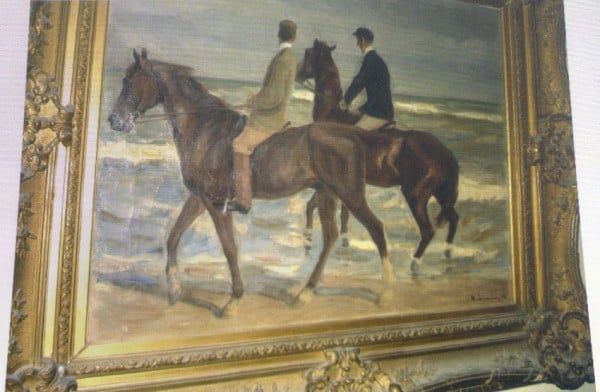Law & Politics
Germany Sued by Holocaust Survivor for Return of Seized Max Liebermann Painting


Sarah Cascone

Retired New York lawyer and Holocaust survivor David Toren is suing Germany for the return of Two Riders on the Beach (1901), by Jewish painter Max Liebermann. Toren claims that work was once owned by his great-uncle, collector David Friedmann. It was one of 1,280 works recovered when German authorities raided the Munich apartment of Cornelius Gurlitt in February 2012. Around 500 of those works are currently undergoing provenance investigations in order to determine what if any ties they may have with Nazi loot. Gurlitt inherited the collection from his father Hildebrand, who, despite being of Jewish ancestry, was one of three dealers enlisted by the Nazis to sell so-called “degenerate art” abroad during the war.
Toren, who claims that he still can remember where Two Riders hung in his uncle’s villa in Breslau, Germany, learned of the painting’s inclusion in the cache when news of its discovery broke in November. A retired intellectual property lawyer, now blind at age 88, Toren escaped Germany when he was 14 with his brother (92 and living in London) through a Kindertransport rescue mission. Their parents, who stayed behind, died at Auschwitz. Among the first few to file a claim for works in the Gurlitt collection, Toren says that he has filed this suit due to a lack of response from the German government. He claims that by failing to publicize the artwork’s discovery for almost two years and by delaying the return of the painting, the government has “perpetuated the suffering of victims of the Holocaust.”
Though a portion of Hildebrand Gurlitt’s collection was investigated by the Monuments, Fine Arts, and Archives unit of the United States military (the subject of the recently released George Clooney film), the Army soon returned the 100 or so artworks. The reportedly unwell and reclusive, Cornelius Gurlitt recently launched a website that presents his side of the dispute. The website maintains that “there are no legal grounds that would compel Cornelius Gurlitt to return,” the majority of artworks confiscated by Bavarian authorities, and claims that at most 3 percent of the works in question could by eligible for restitution. The site does note, however, that Two Riders is one of four paintings that are currently the subject of “exploratory talks” regarding their possible return to earlier owners. Germany’s Städtische Museum Mainz (Mainz City Museum) has also laid claim to 56 of Gurlitt’s paintings.
An additional 60 artworks were recently removed from Cornelius Gurlitt’s Salzburg home for their safety. Gurlitt’s representatives are currently investigating whether any works in this smaller group have Nazi ties. However, they do not expect that to be the case.